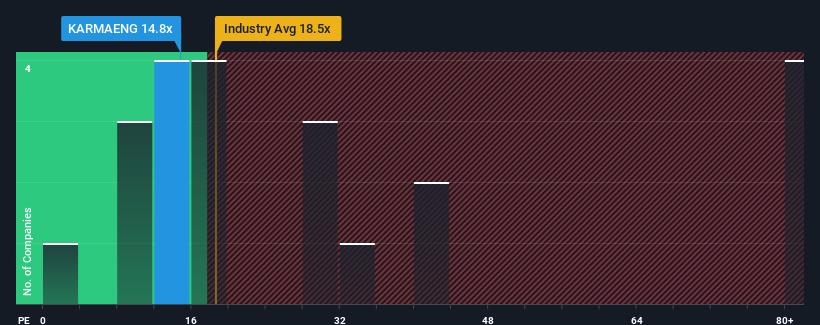- India
- /
- Renewable Energy
- /
- NSEI:KARMAENG
Why Investors Shouldn't Be Surprised By Karma Energy Limited's (NSE:KARMAENG) 26% Share Price Plunge
Karma Energy Limited (NSE:KARMAENG) shares have retraced a considerable 26% in the last month, reversing a fair amount of their solid recent performance. The good news is that in the last year, the stock has shone bright like a diamond, gaining 161%.
Although its price has dipped substantially, given about half the companies in India have price-to-earnings ratios (or "P/E's") above 31x, you may still consider Karma Energy as a highly attractive investment with its 14.8x P/E ratio. Although, it's not wise to just take the P/E at face value as there may be an explanation why it's so limited.
Karma Energy certainly has been doing a great job lately as it's been growing earnings at a really rapid pace. One possibility is that the P/E is low because investors think this strong earnings growth might actually underperform the broader market in the near future. If that doesn't eventuate, then existing shareholders have reason to be quite optimistic about the future direction of the share price.
See our latest analysis for Karma Energy

Does Growth Match The Low P/E?
The only time you'd be truly comfortable seeing a P/E as depressed as Karma Energy's is when the company's growth is on track to lag the market decidedly.
Taking a look back first, we see that the company grew earnings per share by an impressive 119% last year. Although, its longer-term performance hasn't been as strong with three-year EPS growth being relatively non-existent overall. Therefore, it's fair to say that earnings growth has been inconsistent recently for the company.
Weighing that recent medium-term earnings trajectory against the broader market's one-year forecast for expansion of 25% shows it's noticeably less attractive on an annualised basis.
With this information, we can see why Karma Energy is trading at a P/E lower than the market. Apparently many shareholders weren't comfortable holding on to something they believe will continue to trail the bourse.
The Bottom Line On Karma Energy's P/E
Having almost fallen off a cliff, Karma Energy's share price has pulled its P/E way down as well. Typically, we'd caution against reading too much into price-to-earnings ratios when settling on investment decisions, though it can reveal plenty about what other market participants think about the company.
We've established that Karma Energy maintains its low P/E on the weakness of its recent three-year growth being lower than the wider market forecast, as expected. At this stage investors feel the potential for an improvement in earnings isn't great enough to justify a higher P/E ratio. Unless the recent medium-term conditions improve, they will continue to form a barrier for the share price around these levels.
We don't want to rain on the parade too much, but we did also find 4 warning signs for Karma Energy that you need to be mindful of.
If you're unsure about the strength of Karma Energy's business, why not explore our interactive list of stocks with solid business fundamentals for some other companies you may have missed.
Valuation is complex, but we're here to simplify it.
Discover if Karma Energy might be undervalued or overvalued with our detailed analysis, featuring fair value estimates, potential risks, dividends, insider trades, and its financial condition.
Access Free AnalysisHave feedback on this article? Concerned about the content? Get in touch with us directly. Alternatively, email editorial-team (at) simplywallst.com.
This article by Simply Wall St is general in nature. We provide commentary based on historical data and analyst forecasts only using an unbiased methodology and our articles are not intended to be financial advice. It does not constitute a recommendation to buy or sell any stock, and does not take account of your objectives, or your financial situation. We aim to bring you long-term focused analysis driven by fundamental data. Note that our analysis may not factor in the latest price-sensitive company announcements or qualitative material. Simply Wall St has no position in any stocks mentioned.
About NSEI:KARMAENG
Karma Energy
Engages in the generation of power from renewable sources in India.
Excellent balance sheet with slight risk.
Similar Companies
Market Insights
Community Narratives



